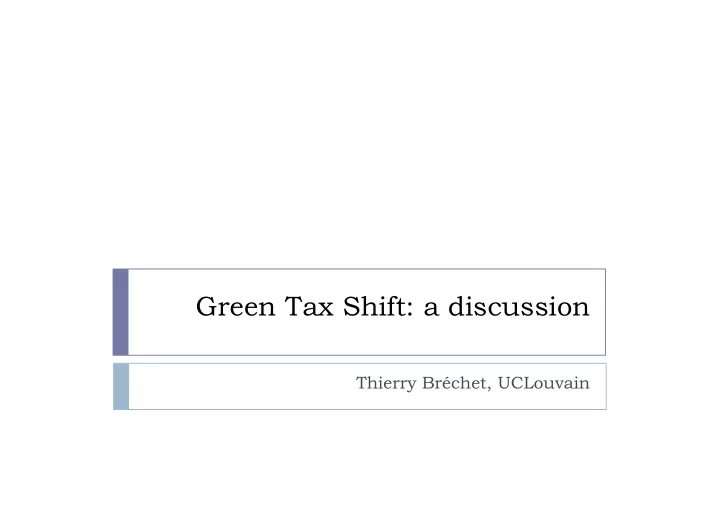

Green Tax Shift: a discussion Thierry Bréchet, UCLouvain
Outline of the talk ① Rationale for price regulation ② From ‘pigovian tax’ to ‘tax shift’ ③ Three key issues 2
Preliminary comment Fiscal policy has two (somewhat compelling) objectives: - to raise revenue for public spending - to provide incentives for behavioural changes Here we focus on the latter issue. 3
1. The rationale for price regulation Candidate policy instruments are: - command-and-control - price regulation (taxes or subsidies) - cap and trade systems (like EU-ETS on CO 2 ) In environmental matters, policy makers are used to favoring command-and-control But economic theory shows that, for some pollutants , price regulation is more efficient ‘ efficiency ’ = to reach a given globally optimal target at the lowest global cost . 4
Pigovian tax Evidence: market failures in the presence of public goods (or public bads) Pigou (1920) proposes taxation as a solution - pigovian tax : ‘external marginal cost at the social optimum’ - requires to associate a monetary value to environmental damages « Polluter Pays Principle » (OECD, 1972; EC) Not to be confused: - efficiency principle : internalization of external costs - responsibility principle : polluter pays for damages 5
2. From ‘pigovian tax’ to ‘tax shift’ Basic idea: to increase taxation on what is ‘bad’ to reduce taxation on what is ‘good’ Examples: pollution is bad innovation is good ‘Bad’ – ‘Good’: uneasy to define ! So the challenge is twofold: - to put taxes on pollutants (which level, which pollutant?) - to find the fiscal policy mix that maximizes global welfare 6
Consensus in international institutions? European Environment Agency: « Ecological Tax Reform can help us to realign a European economy that is still characterised by an insufficient use of labour resources and an excessive use of natural resources », J. McGlade, Executive Director of the EEA, 2007. OECD: Promotes the PPP since 1972. Proposes to establish Green Tax Commissions Advocates for cancelling ‘bad’ subsidies ( e.g . on coal). In 2011, will deliver its 'Green Growth Strategy'. 7
NGOs’ positions Basically, most of them are against market mechanisms… … or they do not know them (example: discounting) A Belgian counter-example: Inter Environnement Wallonnie’s position on the role of fiscal policy Their challenge: to find the fair balance between complementary approaches: economic instruments, command-and-control, citizenship, awareness, education, lobbying… 8
3. Three key issues 1. What tax level on pollution? 2. Redistributive effects 3. Killing two birds with one stone? 9
What tax level on pollution? Setting the pigovian tax requires to know the external cost of pollution -> need for further empirical studies (ex: ExternE project) Cost-Benefit Analysis: balancing global costs with global benefits 10
Redistributive effects Redistributive effects may be huge: - low-income households typically suffer from environmental taxation ( e.g., on CO 2 ) - same at the sectoral level (double dividend, not for all) Not all agents gain to the policy: political acceptability A solution : lump-sum transfers 11
Killing two birds with one stone? The order of magnitude from the shift-effect may be rather small The tax shift may be less efficient than targeted measures Example: a CO 2 tax with a reduction in employer’s social contribution 12
Concluding remarks There exist many opportunities to reshape the fiscal policy towards a greener fiscal system Price regulation is one among many policy instruments for environmental regulation Redistributive effects may be huge: there is a need for accompanying measures Empirical evaluation of costs and benefits is required to set the optimal policy 13
Recommend
More recommend